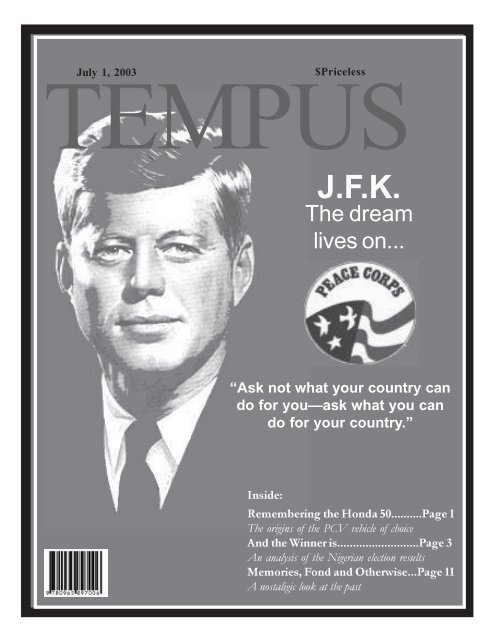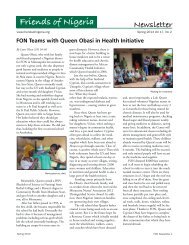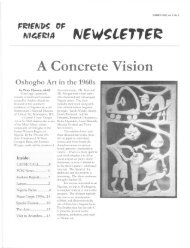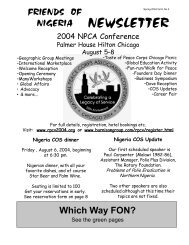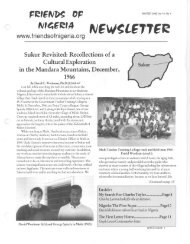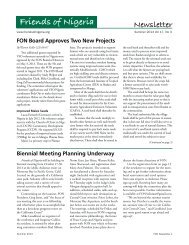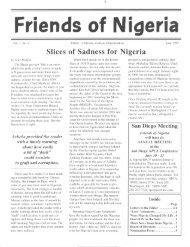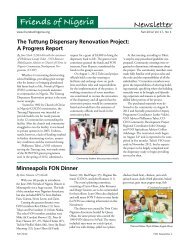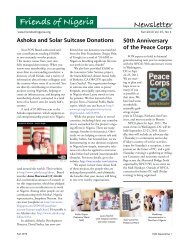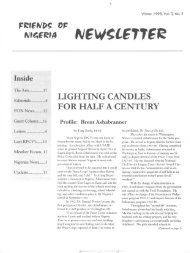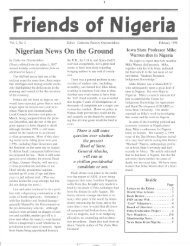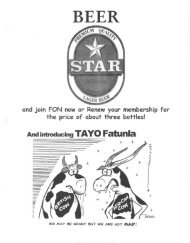0704 Summer 2003.pdf - Friends of Nigeria
0704 Summer 2003.pdf - Friends of Nigeria
0704 Summer 2003.pdf - Friends of Nigeria
You also want an ePaper? Increase the reach of your titles
YUMPU automatically turns print PDFs into web optimized ePapers that Google loves.
July 1, 2003$PricelessTEMPUSJ.F.K.The dreamlives on...“Ask not what your country cando for you—ask what you cando for your country.”Inside:Remembering the Honda 50..........Page 1The origins <strong>of</strong> the PCV vehicle <strong>of</strong> choiceAnd the Winner is..........................Page 3An analysis <strong>of</strong> the <strong>Nigeria</strong>n election resultsMemories, Fond and Otherwise...Page 11A nostaligic look at the pastSUMMER 2003 1
Your newsletterneeds you!How Time flies — how quickly our memoriesfade...There can be few readers <strong>of</strong> the newsletter whose lives were not insome way, and for some pr<strong>of</strong>oundly so, affected by their time spent in thePeace Corps. We hope the newsletter helps keep the flame alive <strong>of</strong> thoseheady days back in <strong>Nigeria</strong> where careers were born, friendships sealed,personal values changed and many happy memories formed.Share those memories.• Tell us how <strong>Nigeria</strong> changed your life.• Let us know what you have been doing all these years.• Share with us your memories <strong>of</strong> <strong>Nigeria</strong>.(With aplogies to Lord Kitchener)Take a moment to write a few words for the newsletter while your memory is still crystal clear about what reallyhappened all those years ago.How time flies — how quickly the world changes...One <strong>of</strong> the frustrations with this job is that as we have to send the newsletter by bulk mail, most <strong>of</strong> you onlyreceive it about four weeks after printing.As a result, a number <strong>of</strong> articles we publish are somewhat out <strong>of</strong> date by the time you read them and some,because <strong>of</strong> the delay, we don’t print at all.How time flies — before you know it is time to renew...Why is FON like PBS? We both <strong>of</strong>fer our services to all viewers or readers although a relatively small numberactually are members.Consider the special goldenrod cover on every other issue to be our FON pledge break.As the newsletter arrives every three months whether you are a paid-up member or not, it’s easy to forget to renewyour membership. Please check your renewal date on the mailing label. Peter Hansen, the FON Membership Chair,recently contacted a number <strong>of</strong> lapsed members with great success.On the positive side, Peter also reports that at the moment the membership stands at some 437 members out <strong>of</strong> atotal possible <strong>of</strong> over 1600 or just about 27%. This is the highest number onrecord to date and a good percentage for an organization like this but as myteachers used to say, there is room for improvement.No . Sir,What would we do with the added income <strong>of</strong> many more members? Well we I don’t mean maybe...might• send out the newsletter by first class mail…• increase the size <strong>of</strong> the newsletter…• launch into colour or even possibly color…• provide additional suppot for development projects in <strong>Nigeria</strong>...Andy PhilpotEditor.2 FON NEWSLETTER
FRIENDS OFNIGERIASUMMER 2003 Vol 7, No 4NEWSLETTERRememberingThe HONDA 50By Jack Finlay (03) 61–64I never had one. The Honda 50 came after our time asvolunteers. But we are connected, somehow, I think—if you canbelieve the following story. When Johnny Skeese (03) 61–64 andI returned from a year in Gabon in mid ’65, it seemed thatpractically every volunteer had one. We recall there wereaccidents—some even fatal, as we still remember a fallencomrade from those days. But the Honda 50 also provided agood deal <strong>of</strong> pleasure to volunteers <strong>of</strong> the 60’s. And we arecertain that many <strong>of</strong> you have a story or two to tell about yourHonda 50. Some <strong>of</strong> your as yet untold tales are no doubthumorous. Following early accidents, we recall that Peace Corps<strong>Nigeria</strong> issued certain strict rules—one being that any volunteercaught riding his or her Honda 50 without a helmet would besent home. Does anyone really know if any PCV was sent homefor such an infraction? We do not, but we do know <strong>of</strong> onevolunteer who had to use his Honda when there was no helmeton hand. As he told it, he went to the kitchen and obtained ametal pot which he placed over his head. He then drove the 15–Johnny (l) and Jack (r) at the Ghanaborder with the Ivory Coast.Sweet young thing: Are you applying for the Peace Corps?Macho man: No way! You have to wear a helmet.20 km required <strong>of</strong> him at the time—in the hope that, in theevent caught, his “effort” would be considered and leniencyapplied to this strict helmet rule. If the chap involved is “outthere,” rest assured that at least this one <strong>of</strong> your stories isremembered.But our story is perhaps linked to the origin <strong>of</strong> the Honda50—or so we have come to think. Back to the beginning. Whenwe—i.e. <strong>Nigeria</strong> (03)—arrived in December <strong>of</strong> 1961, <strong>Nigeria</strong>(01) was on hand at the Lagos airport to greet us. Remember—<strong>Nigeria</strong> One had gone to the country long before the rest <strong>of</strong> us.In fact, though Ghana (01) received all the attention (and Whitehouse send<strong>of</strong>f), <strong>Nigeria</strong> (01), I believe, was the very first PCVgroup overseas! But, <strong>of</strong> course, they went there (after a couplemonths at Harvard) for continued pre-service training at theUniversity <strong>of</strong> <strong>Nigeria</strong> at Ibadan. In the meantime, we started ourstateside training at UCLA in August ’61. Both <strong>Nigeria</strong>(01)and(03) began their PCV teaching assignments in January 1962.<strong>Nigeria</strong> (02)(University <strong>of</strong> <strong>Nigeria</strong> at Nsukka folks) was thereforethe first PCV group to actually begin work in <strong>Nigeria</strong> havingarrived for duty in the fall <strong>of</strong> ’61. In those days, there were no(Continued on page 9)SUMMER 2003 3
FRIENDS OF NIGERIANEWSLETTERQuarterly publication <strong>of</strong><strong>Friends</strong> <strong>of</strong> <strong>Nigeria</strong>, Inc.affiliate <strong>of</strong> theNational Peace Corps AssociationEditorAndy Philpotaphilpot@mountaincable.net<strong>Nigeria</strong> News EditorVirginia DeLanceyv-delancey@northwestern.eduUpdate EditorDave Sugarmanlwacoboy@comcast.netProduction StaffNatoma (Nash) Noblenoblenn@millsaps.eduEarl (Buzz) Welkermysk3@aol.comGregory Zellgregzell@mindspring.comPeter J. Hansenpjhansen@ia.netPrinterLeesburg Printing CompanyLeesburg, FloridaBOARD OF DIRECTORSPresidentGregory Zellgregzell@mindspring.comVice PresidentFrieda Fairburnfrieda@madbbs.comMembership ChairPeter J. Hansenpjhansen@ia.netSecretaryKen Saleksale@aol.comVirginia DeLanceyv-delancey@northwestern.eduMike Goodkindmgoodkind@earthlink.netAndy Philpotaphilpot@mountaincable.comDavid Straindestrain@pacbell.netwww.friends<strong>of</strong>nigeria.orgWebsite ManagerGreg JonesNewsletter ManagerCLeigh Purvis Gerber24FON NEWSLETTERLetters to the Editor29 April 2003Dear Editor,What Happens When Your CountryWrites the Post Card?Training in the 1960s as <strong>Nigeria</strong> (07) wewere very familiar with the ramifications <strong>of</strong>sending a postcard home thatmight beintercepted by ourhost country. Itwas an idealinstitutionalscenario with thethe onus placed onthe individual. ButBob in <strong>Nigeria</strong> in 1964what happenswhen your countrywrites the post card—illegally invading anothercountry and murdering many civilians in theprocess? What do you do then as a PeaceCorps Volunteer?This is the question I pondered as Iprepared to go on yet another march (inLondon, April 12) opposing the attack/war/occupation <strong>of</strong> Iraq. Attaching my first walkingshoes that my mother had lovingly saved since1939, to a piece <strong>of</strong> card to leave at ParliamentSquare in memory <strong>of</strong> the dead, I added thefollowing words, in part: “I grew up (in Seattle,Washington) believing that the troops Ientertained as a childhood tap dancing starwere fighting for freedom, the Good and aworld <strong>of</strong> friendship. I now walk in loathingover sixty years later. The Governments <strong>of</strong> mycountry <strong>of</strong> birth (USA) and my country <strong>of</strong>adoption (UK) have become the bullies <strong>of</strong> theworld.”How would I be placed defending mycountry as bully? What integrity would I haveas a Peace Corps Volunteer when in my time in<strong>Nigeria</strong> it was not unusual for students to askabout what had happened to Native Americans,and latterly (when I continued on contract atthe University <strong>of</strong> <strong>Nigeria</strong>, Nsukka) what wastaking place in Viet Nam?A radicalizing moment in my volunteeryears came when the US ambassador’s visit wasreported as part <strong>of</strong> his mission to obtainconcessions from national/regionalgovernments to lower taxes for US firmsinvesting/wanting to invest in <strong>Nigeria</strong>. Herewas <strong>Nigeria</strong> massively committing its resourcesto universal primary education, and I was avolunteer as part <strong>of</strong> the wider educationalproject and ‘an ambassador <strong>of</strong> the US’, and theUS wanted to wrest the basis <strong>of</strong> valuableresources from <strong>Nigeria</strong>. The cost <strong>of</strong> my beingin <strong>Nigeria</strong> would be more than <strong>of</strong>fset by taxconcessions—in fact, indirectly I would be paidat the cost <strong>of</strong> <strong>Nigeria</strong>n educational pounds. WasI the gloss for US international markets?As I marched, I wondered if other PCVsimagined similar dilemmas–engagement with thevitality <strong>of</strong> other peoples/lives/languages and yetan assumed accomplice to US internationalaggression. And more specifically, were otherPCVs imagining our counterparts in Iraq wakingup to find all three <strong>of</strong> their sons dead?The reassurances <strong>of</strong> Jody Olsen, PeaceCorps Deputy Director (Security Evolving forVolunteers) are very instructive. Hardly sparinga thought for the actions <strong>of</strong> the USGovernment as the cause <strong>of</strong> concern forvolunteers (so unlike the individual onus placedon Michelmore for writing the post card), shequickly moves to the importance <strong>of</strong> consolidation.Clearly thestruggles with myimaginings as aformer PeaceCorps Volunteerare misplaced.With US militarybases nowgridding andgirding the globe,why not base thevolunteers inthem to go outand hawk wareswhen hostilitiesBob at Coventry Universityin 2003temporarily cease? The wonderful thing aboutthat is it manages, too, to celebrate that greatAmerican frontier tradition <strong>of</strong> forts. And whilewe are at it, why not rename the Peace Corpsthe Pacification Corps. It so much morenormalises occupation and aggression.Bob Bennett (07) 63–65Bob is on the verge <strong>of</strong> retirement from CoventryUniversity (U.K.) where he has been a full-timelecturer in Communication, Culture and Media forthe last eight years. He plans to spend retirementwriting, active in gay/lesbian projects, and mutuallycaring for loved ones. Ed.Photo: Ralph Proctor Museum, Pittsburgh
Photo: BBC(Episode Four)By Ron Singer (10) 64–67... certainly, President Obasanjo and his party, the People’sDemocratic Party (PDP). An undetermined majority <strong>of</strong> the 60-plus million voters at over 120,000 polling places gave Obasanjo62% <strong>of</strong> the vote. Among his notable opponents, Buhari’s AllAfter registration, voters waited patiently to cast their ballots.<strong>Nigeria</strong> People’s Party (ANPP) got 32%; Ojukwu, 3%; and thedemocratic standard bearers, Fawehinmi and Nwachukwu, lessthan 1% between them. The PDP now controls both Federalhouses and 28 <strong>of</strong> 36 governorships. Although the ANPP wonseven gubernatorial races in the north and took two new statesthere, the PDP swept the rest <strong>of</strong> the country, including severalprevious Alliance for Democracy (AD) strongholds like Oshun,Ogun, Oyo and Ondo. The single exception was Lagos, whereAD Governor Bola Tinubu escaped the general shipwreckHow tainted these results are depends on who you ask.International observers noted significant fraud and violence inthe Middle Belt and the non-Delta states <strong>of</strong> the midwest andmassive fraud and violence in the Delta and eastern states. InEnugu, ballot boxes were stolen in broad daylight. PresidentObasanjo has already initiated an investigation into whathappened in the four Delta states. In Rivers, almost no onevoted in the state house elections on May 3, after a recordturnout on June 19 for the presidential and gubernatorialelections. One small northern party is calling for a completererun and two weeks ago, there was an unreported coup attemptin the Middle Belt against pro-Obasanjo <strong>of</strong>ficers. However, afterinitial fears <strong>of</strong> direct mass action, almost all the losers are nowlining up to make their cases before the election tribunal set upfor this specific purpose.The outside observers’ verdict <strong>of</strong> relative fairness in the westis starkly belied by eyewitness accounts. For instance, JumokeOgunkeyede, who wound up working for the incumbent ADgovernor <strong>of</strong> Oshun, Bisi Akande, says sarcastically, “The electionAnd the Winner Is ... :The <strong>Nigeria</strong>n Electionswas not rigged. The incumbent government perpetuated amarket-place daylight rape.” Millions <strong>of</strong> naira were paid forvotes. Even Jumoke, himself, shamefacedly admits to havinghanded out money in the villages at night in a vain attempt tocounter the huge PDP largesse. At 9:45 a.m. at a polling stationin Oshun, Jumoke was told by a PDP candidate what the final(heavily PDP) tally would be. A few minutes after four, the tallycame in at exactly this number. In some areas, teenage boys werebussed from polling station to polling station, their pinkieshaving been cleaned <strong>of</strong>f with indelible-ink remover betweenvoting opportunities. All <strong>of</strong> these details suggest that outsideobservers may have their shortcomings. They may be blind tocertain types <strong>of</strong> chicanery and intimidation perhaps, becausethey neither speak the languages, understand the cultures, norhave access to many <strong>of</strong> the places where machetes are wieldedand stacks <strong>of</strong> naira handed out.The largest change in the political moonscape is the eclipse<strong>of</strong> the AD. There are many stories about what went wrong forthe party. Obasanjo was, in a sense, a favorite son, andincumbency and coattails weighed inordinately on the Yorubaelectorate. Deal making by the AD and by Adesanya, leader <strong>of</strong>the ethnic group, Afenifere, apparently backfired. Once theANPP chose Buhari as their standard bearer, the Yorubaleadership may have felt they had no choice other than to dealwith the President (in whose cabinet Adesanya’s daughter is aminister). Apparently, the arrangement was for ticket-splitting:Obasanjo for President, AD for the rest. But this did nothappen. People voted straight PDP or did not even bother tocast non-Presidential votes. In many cases, voters saw nobenefits from four years <strong>of</strong> AD rule: the party might well havelost even fair elections.In Oshun, loser Bisi Akande, known as a relatively honestman who gets things done, had alienated teachers, civil servantsand a large part <strong>of</strong> the electorate with plain budget talk and cuts.Former United States President Jimmy Carter,heading a monitoring team observing the elections,described the turnout as impressive and orderly.Photo: BBC(Continued on page 15)WINTER 2003 5 3
<strong>Nigeria</strong> NewsUnions Call a General Striketo Protest Fuel Price HikePolice fired tear gas and live warningshots into the air to break up crowds <strong>of</strong>demonstrators, and militant unionmembers torched barricades as ageneral strike over fuel prices brought<strong>Nigeria</strong> to a standstill on Monday, June30. Later that day, security forces shotdead four <strong>Nigeria</strong>ns in Abuja, and aspeeding vehicle crashed into a group<strong>of</strong> demonstrators in Lagos, killing fourmore. Stores and <strong>of</strong>fices closed inLagos, including those <strong>of</strong> multinationaloil companies. International anddomestic airline flights ran hours late,or not at all, after air traffic controllersjoined the protest. Government <strong>of</strong>ficesand businesses in Abuja, Kano, Kaduna,and Port Harcourt also closed.Pamphlets distributed by the <strong>Nigeria</strong>Labour Congress (NLC) urged thepublic to ransack businesses thatopened during the strike and also calledon President Obasanjo to step down.As the strike spread, world oil pricesrose out <strong>of</strong> fear that the strike woulddisrupt <strong>Nigeria</strong>’s exports.The NLC had called for anindefinite general strike, unless thegovernment reversed an increase in fuelprices. The Petroleum and Natural GasSenior Staff Association <strong>of</strong> <strong>Nigeria</strong>(PENGASSAN) initially said that thestrike would not disrupt the processes<strong>of</strong> production, transportation, andrefining <strong>of</strong> crude oil, as shutting downthose facilities needs carefully plannedoperations. Yet it also said that if noagreement was reached by Tuesday, itwould have no choice but to shut downall operations in the oil and gas industry.PENGASSAN plays a critical role inloading <strong>Nigeria</strong>’s crude oil, as itsmembers monitor the quality andvolumes at export terminals.President Obasanjo called talks withthe NLC, the fuel marketers, and histop experts on petroleum and energy.However, the NLC president claimedthat Obasanjo had only agreed to set upa committee to look into the NLC’sarguments against a price increase.46FON NEWSLETTEREdited by Virginia DeLancy (04) 62–64Although the committee was to beginwork immediately, there was no indication<strong>of</strong> when it would report back. Obasanjohas vowed, however, that he will not bowto NLC demands.The government recently increasedpetrol, diesel, and kerosene prices bymore than 50 percent to eliminatesubsidies on fuel and curb the smuggling<strong>of</strong> <strong>Nigeria</strong>n petroleum products toneighboring countries where prices aremuch higher. The smuggling has beenpartly responsible for chronic fuelshortages within the country. Obasanjoalso says that <strong>Nigeria</strong> cannot afford cheappetrol because subsidies on importedrefined oil products <strong>of</strong> some $2 billionannually are diverting money from criticalsocial services such as health andeducation, and the country’s fourrefineries are unable to meet localdemand. (Source: UN Integrated RegionalInformation Networks [IRIN], 6/25/03; P.M.News [Lagos], 6/25/03; NY Times, 6/28/03, 6/30/032, 7/1/03).President Bush to Travel toAfrica in JulyPresident Bush will make his first tripto Africa from July 7-12, visiting Senegal,South Africa, Botswana, Uganda, and<strong>Nigeria</strong>. The trip was postponed fromJanuary because <strong>of</strong> the then-impendingwar with Iraq. The agenda is expected toinclude the fight against AIDS, counterterrorism,and economic development.A new law authorizes a tripling <strong>of</strong> U.S.funds to $15 billion over the next fiveyears for fighting AIDS in 12 African and2 Caribbean countries. Bush has alsoproposed a 50% boost, to a total <strong>of</strong> $15billion a year by 2006, in aid fordeveloping countries, but the additional$5 billion would only go to the few poorcountries who are sufficiently tacklingcorruption, are committed to openmarkets, and are undertaking politicalreforms. In addition, the president hopesto complete negotiations on a trade dealwith Australia and countries in SouthernAfrica in 2004. (Source: NY Times, 6/20/03, 6/23/03; This Day [Lagos], 6/9/‘03).Chief Bola Ige’s SuspectedKiller Appointed MinisterPresident Obasanjo has appointed Dr.Adewale Oladipo minister-designate,representing Osun State. Oladipo, alecturer at Obafemi Awolowo University,Ile Ife, is one <strong>of</strong> the 16 suspects arrestedfor the December 23, 2001 murder <strong>of</strong>Chief Bola Ige, former Attorney General<strong>of</strong> <strong>Nigeria</strong>. The police in Abuja detainedhim for more than 7 weeks before beingreleased, although he claimed that heneither recruited thugs nor arranged anyvehicle to kill Ige, and that he neverplanned to kill anyone. (P.M. News[Lagos], 6/25/03).In early June, the Ige family withdrewfrom the trial <strong>of</strong> the suspected killers <strong>of</strong>the former Attorney General, expressingdismay at what they called the turning <strong>of</strong>the trial into “a stage for political theatrewith the accused treated as celebrities, . . .“ Prosecutors in the trial declared,however, that the case would go onregardless <strong>of</strong> the decision <strong>of</strong> the family,as the state, rather than the Ige family,owns the case. (Source: Vanguard[Lagos], 6/12/03).Obasanjo’s Daughter is NamedCommissionerPresident Obasanjo’s daughter Iyabois on the list <strong>of</strong> thirteen commissionernominees sent to the Ogun State House<strong>of</strong> Assembly. Iyabo, a veterinary doctor,is slated for the Ministry <strong>of</strong> Health.(Source: P.M. News [Lagos], 6/24/03).Minister <strong>of</strong> Health Ransome-Kuti DiesPr<strong>of</strong>. Olikoye Ransome-Kuti,renowned pediatrician and formerMinister <strong>of</strong> Health (1985-1992), passedaway on June 1 at the age <strong>of</strong> 75 whileattending a World Health Organizationmeeting in London. Over the years, heheld many positions in London and<strong>Nigeria</strong>, especially at the University <strong>of</strong>Lagos where, until his appointment asMinister, he was a director <strong>of</strong> the(Continued on page 5)
(Continued from page 4)Institution <strong>of</strong> Child Health and PrimaryHealthcare (1981-1985). As Minister <strong>of</strong>Health, he expanded the Programme onImmunisation for children andemphasized the advantages <strong>of</strong> breastfeeding. He was also an advocate foropenness in recognizing the threat fromAIDS. He publicized the first <strong>Nigeria</strong>nAIDS case in 1986 and acknowledged in1997 that the death <strong>of</strong> his world-famousmusician brother Fela Anikulapo-Kuti wasfrom AIDS. At the time <strong>of</strong> his death,Pr<strong>of</strong>. Ransome-Kuti was chairman <strong>of</strong> an18-nation body, the Better Health inAfrica Panel <strong>of</strong> the World Bank, NationalPrimary Healthcare Development Agencyunder the Federal Ministry <strong>of</strong> Health, anda member <strong>of</strong> the Board <strong>of</strong> PathfinderInternational USA. (Source: Vanguard[Lagos], 6/7/03; This Day [Lagos], 6/21/03; Africa Action [Africa Policy E-Journal],6/22/03).Global Fund for AIDS to Grant$150 Million to Fight AIDS,TB, and MalariaThe Federal Government has signed agrant agreement with the The GlobalFund for AIDS for $150 million. Thecountry will have immediate access toabout $28 million for expansion <strong>of</strong> itsanti retroviral drug program andprevention <strong>of</strong> mother to childtransmission <strong>of</strong> HIV/AIDS. The twoinstitutions that will benefit from thegrant are the Yakubu Gowon Centre forUnity and International Peace, and theNational Action Committee on AIDS(NACA). To have access to the GlobalFund for AIDS, the government set up a38-member country coordinatingmechanism that sent 5 proposals to thefund that were approved. <strong>Nigeria</strong> wasone <strong>of</strong> the first countries to donate to theGlobal Fund for AIDS with acontribution <strong>of</strong> $10 million. (Source:Daily Trust [Abuja], 6/25/03)Vice President Atiku AbubakarTravels to U.S.Vice President Atiku Abubakartraveled to the U.S. to participate in thisyear’s US-Africa Business Summit,organized biennially by the CorporateCouncil on Africa (CCA). The summitbrings together business and governmentleaders in the U.S. who are committed topromoting trade and investment betweenthe U.S. and Africa. In addition tointeracting with members <strong>of</strong> the CCA,Abubakar was expected to address thesummit on the initiatives <strong>of</strong> the <strong>Nigeria</strong>ngovernment to curtail the impact <strong>of</strong>HIV/AIDS among <strong>Nigeria</strong>’s productivepopulation. (Source: Daily Trust [Abuja],6/25/03).LNG Ltd. Exports LiquefiedGas to U.S.The <strong>Nigeria</strong> LNG Ltd. exported thefirst liquefied petroleum gas (LPG) fromthe Bonny LNG plant. U.S. oil traderVitol purchased 40,000 metric tons <strong>of</strong> theLPG at the current international marketprice <strong>of</strong> $261 per metric ton. The LNGplant began production <strong>of</strong> LPG lastMarch, with a plant capacity <strong>of</strong> onemillion metric tons per annum. (Source:This Day [Lagos], 6/25/03).Yoruba Keyboard Wins AwardThe effort <strong>of</strong> African LanguagesTechnology Initiative (Alt-I), a researchand development organization headed byTunde Adegbola, a computer scientist andlinguist, has developed Africa’s firstindigenous language keyboard. TheYoruba keyboard won this year’s edition<strong>of</strong> the IICD Award on Local ContentApplications <strong>of</strong> InformationCommunication Technologies (ICTs).The award is one <strong>of</strong> the AfricanInformation Society Initiative (AISI)Media Awards <strong>of</strong> the UN EconomicCommission for Africa (UNECA) thatrecognizes users <strong>of</strong> innovativeapplications <strong>of</strong> ICTs to local contentdefined as “the expression <strong>of</strong> the locallyowned and adapted knowledge <strong>of</strong> acommunity” in Africa.Prior to the Alt-I’s Yoruba Keyboard,one single character might sometimesrequire up to five keystrokes on thecomputer keyboard. In response, Alt-Ideveloped a modification <strong>of</strong> theQWERTY keyboard to guarantee that noYoruba character will require more thantwo keystrokes. The scheme takesadvantage <strong>of</strong> the fact that Yoruba neveruses the letters Q, Z, X, C and V, todevelop Yoruba fonts and other s<strong>of</strong>twarecomplements that take account <strong>of</strong> thecomplete Yoruba character set and toremap the QWERTY keyboardaccordingly. (Source: This Day [Lagos],6/12/03, 6/23/03).Nwankwo Kanu Brings U.S.Doctors to <strong>Nigeria</strong>Twenty-one U.S. doctors werescheduled to travel to <strong>Nigeria</strong> for twoweeks in June and July, courtesy <strong>of</strong> theKanu Heart Foundation, to performoperations on 50 children who have heartailments. They will work at the University<strong>of</strong> <strong>Nigeria</strong> Teaching Hospital in Enuguwhere the nation’s first open heart surgerywas carried out some years ago. Afterplaying in the Atlanta ’96 Olympics,Arsenal star Nwankwo Kanu, who isbehind the project, was diagnosed with acareer-threatening heart defect. Afterundergoing surgery in the U.S., herecovered to resume his career. Sincethen, he set up the foundation in aneffort to treat as many children aspossible suffering from heart problemsbut who are unable to afford treatment.(Source: This Day [Lagos], 6/23/03).Mental Tests Ordered forTraffic OffendersThe city <strong>of</strong> Lagos has begun torequire psychiatric tests <strong>of</strong> traffic<strong>of</strong>fenders blamed for the city’s gridlock.Impatient drivers who jump curbs anddrive on the wrong side <strong>of</strong> the streetaggravate Lagos traffic jams. The LagosTraffic Ministry has now ordered policeto arrest <strong>of</strong>fenders, impound theirvehicles, impose $200 fines and ordermandatory psychiatric tests. Hundreds <strong>of</strong>drivers have already been punished underthe new measures, and their vehicles arebeing held until they have received a(Continued on page 6)WINTER 2003 75
(Continued from page 5)“certificate <strong>of</strong> sound mental fitness” froma psychiatric clinic. (Source: ChicagoTribune, 6/20/003)Amina Lawal’s Stoning AppealAdjourned Until August 27Amina Lawal, a mother <strong>of</strong> four, hashad her appeal to overturn her convictionadjourned until August 27, two days afterthe date set for her execution. But, thecourt assured her that the execution willnot go ahead before the appeal has beenheard. A court in Katsina state convictedLawal <strong>of</strong> adultery in March 2002. Shehad borne a child out <strong>of</strong> wedlock.Although she had been divorced for someyears, the mandatory punishment underIslamic law is still death by stoning. Shehas already lost one appeal. After theIslamic court, Lawal will have one morechance to appeal—before <strong>Nigeria</strong>’sSupreme Court.President Obasanjo has promised thatthe sentence would not be carried out,but he has chosen his words carefully. Hewill not intervene directly, nor will hechallenge the right <strong>of</strong> Islamic courts toimpose such punishments. But, he saysthat he is confident that the courts willoverturn the conviction.Another case is also being appealed.A couple in the north-central state <strong>of</strong>Niger, Fatima Usman and AhmaduIbrahim, had originally been sentenced toterms <strong>of</strong> imprisonment. But, when thefather <strong>of</strong> the woman challenged theseverity <strong>of</strong> the prison terms, the sentencewas amended to impose the far harsherdeath sentences. The case highlights whatdefense lawyers dislike about thesystem—the arbitrary nature <strong>of</strong> theSharia legal system. (Source: BBC News,6/3/03; CNN, 6/3/03).U.S. Ambassador Says <strong>Nigeria</strong>is Vulnerable to Al QaedaU.S. Ambassador Howard Jeter hassaid that <strong>Nigeria</strong> faces a real threat <strong>of</strong>terror attack from the al Qaeda networkbecause <strong>of</strong> its close ties with Washington.It is guilt by association, which means that<strong>Nigeria</strong> is being looked at as a kind <strong>of</strong>86FON NEWSLETTERenemy. Jeter said that like other countries,<strong>Nigeria</strong> is not immune to attack and urgednations interested in global peace to jointhe international effort to combatterrorism. In February, al Jazeeratelevision broadcast a message allegedlyfrom bin Laden listing <strong>Nigeria</strong> as one <strong>of</strong>six countries that needed to be “liberated”from U.S. “enslavement.” The other sixstates, which he said Muslims mustliberate by waging jihad against them areJordan, Morocco, Pakistan, Saudi Arabia,and Yemen. (Source: NY Times, 6/14/03).U.S. Ambassador AwardsScholarships to 50 GirlsU.S. Ambassador Howard Jeterpresented scholarships to 50 girl studentsfrom disadvantaged circumstances. Theyinclude girls who are orphaned, havephysical disabilities, and who are fromeconomically poor households in OgunState. The scholarships come under theAmbassador’s Girls Scholarship Program(AGSP) <strong>of</strong> the Education forDevelopment and Democracy Initiative.The AGSP has been underway in 36African countries since 1999, helpingmore than 10,000 girls throughout thecontinent. In <strong>Nigeria</strong>, the program willassist 600 girls in 12 states, representingthe six geo-political zones, with two statesselected in each zone. They are: Borno,Cross River, Edo, Enugu, Gombe, Imo,Kano, Lagos, Ogun, Niger, Sokoto andthe Federal Capital Territory. (Source:This Day [Lagos], 6/11/03).Oil Pipeline Fire Kills 125The death toll <strong>of</strong> a fire that engulfedpeople as they scooped petrol from aburst pipeline in southeast <strong>Nigeria</strong>reached 125, according to the Red Cross.The pipeline transporting fuel fromrefineries in Port Harcourt to Enugu andparts <strong>of</strong> central and northern <strong>Nigeria</strong> wasruptured by thieves at Onicha-Amaiyivillage, 40 km. south <strong>of</strong> Umuahia, theAbia state capital, in early May. Witnessessaid that authorities had continued topump fuel through the line, despite beinginformed <strong>of</strong> the breakage, but <strong>of</strong>ficials <strong>of</strong>the state-owned <strong>Nigeria</strong>n NationalPetroleum Corporation denied knowledge<strong>of</strong> the leakage. Witnesses also said thatpolice colluded with the vandals bycharging villagers 80 cents to scoop upbuckets and barrels <strong>of</strong> fuel for resale.The pipeline caught fire and exploded onThursday, June 19 when it was ignited bya spark from a passing motorcycle.Governor Orji Uzor Kalu <strong>of</strong> Abia Statewho visited the scene ruled out anypossibility <strong>of</strong> paying compensation to thevictims <strong>of</strong> the explosion who he saidwere sabotaging the government. Kalublamed traditional rulers who were aware<strong>of</strong> the vandalization <strong>of</strong> the pipeline butrefused to bring it to the attention <strong>of</strong> thestate government. Yet, he alsoacknowledged that poverty and hungermake people risk the danger <strong>of</strong> scooping.The <strong>Nigeria</strong>n Navy reported recently thatthe nation is losing about N10 billionmonthly in revenue through oil pipelinevandalization and illegal bunkering/scooping. (Source: BBC News, 6/22/03,6/23/03; NY Times,6/21/03, 6/22/03;UN Integrated Regional InformationNetwork (IRIN), 6/23/03; This Day[Lagos], 625/03; Vanguard [Lagos], 6/7/03).<strong>Nigeria</strong>n Customs ServiceConfronts SmugglersThe <strong>Nigeria</strong> Customs Service seizedand buried 287,500 cartons <strong>of</strong> frozenchicken and turkey worth N1.7 billion inthe past year. In response to the publicoutcry over the destruction, thegovernment explained that it was todiscourage importers from going “fowl”<strong>of</strong> the law. The government banned theimportation <strong>of</strong> frozen foods last year toencourage local production.The Customs Task Force onSmuggling has now acquired bullet pro<strong>of</strong>vests and enough vehicles to confrontsmugglers. In addition to frozen food,the largest seizure last year was <strong>of</strong> livecartridges and used vehicles valued atN246.5 million. (Source: This Day[Lagos], 6/24/03).
Welcome!New <strong>Friends</strong> <strong>of</strong> <strong>Nigeria</strong> MembersSince January 1, 2003.Newly found members <strong>of</strong> the<strong>Nigeria</strong> Peace Corps community.Amrein, Polly, Teachers for West Africa, 63-68, KabbaBarnacle, Ann (Duning), (15), 65-67, WudilBesmer, Fremont & Frances (Rose), (07), 63-65,Kabba, Sokoto & KanoBlack, Thomas, (12), 64-66, SokotoBrinker, Linda, staff, 63-65, Enugu & IbadanDible, Craig, (25), 66-68, Kaduna, Azare & OkeneDoucet, Joesph, (17), 65-68, MbawsiGrummon, Mary, staff, 61-62, NsukkaJudge, Paul, (13), 64-66,McClure, John, ( 0)1, 61-63, UmuahiaMcDonald, David & Kathleen (Richardson), (26), 66-68, GbokoOsen, Maureen (McTigue), (08), 63-65, EkpomaSiebert, William J, (31), 68-70, AzareSmythe, Robert & Marianne, (13), (13), 64-66, AbeokutaSwann, Howard, (02), 61-63, NsukkaTufts, Thomas, (11) , 64-67, Iwollo OgheVonk, Kathleen (Rybicki), (26), 67-69, GombeYarbrough, Larry, (17), 65-67, KeffiAmrein, Polly, Teachers for West Africa, 63-68, KabbaBrinker, Linda, staff, 63-65, Enugu & Ibadan(widow <strong>of</strong> Jerry Brinker, PC physician in Enugu & Ibadan)Dible, Craig, (25), 66-68, Kaduna, Azare & OkeneHansen, Carol, (13), 64-67, AkureJackson, Brian, (00)2, 92-93Martin, Wesley, (15), 65-67, Awka EtitiMcConnell, Donald & Frances (Ruegsegger), (09), 63-65,Ete Opobo (D), Orlu (F)Mitchell, Jane, (31), 68-70, MaiduguriMoline, Donald, (11), 64, AbuduOsen, Maureen (McTigue), (08), 63-65, EkpomaPatton, Will, (31), 68-70, KanoPuckett, Douglas, (24), 66-67, DegemaSoloway, Irving, (25), 66-67, Funtua, Kaduna & Kano areaStevens, Gordon, (19), 65-67, Sokoto & IlorinTucker, Thomas, (003), 93-95Wallace, Robert, (12), 64-66, Benin CityPeace Corps Expansion WindingIts Way Through CongressLegislation which would expand the Peace Corps was set fora full House vote this summer after the House InternationalRelations Committee approved the measure 31 to 4 on June 12.Dave Hibbard, (01) 61–63, who has co-chaired an advisorycommittee to promote Peace Corps expansion legislation, hasurged all <strong>Friends</strong> <strong>of</strong> <strong>Nigeria</strong> members to ask their representativesto vote for the measure, House Resolution 2441 (H.R.2441)The latest version <strong>of</strong> the Peace Corps Expansion Act wouldauthorize a doubling <strong>of</strong> the number <strong>of</strong> Peace Corps volunteersoverseas and proposes a $10 million Congressional fund tosupport global education projects performed by returned PeaceCorps volunteers. House leaders paired the measure withanother international development proposal, the MillenniumChallenge Account Authorization, which would expand U.S.economic assistance to approximately 10 high-performingcountries in the developing world with a proven track record <strong>of</strong>accomplishment in the areas <strong>of</strong> economic freedom, democracyand investments in health and education sectors. The MCAlegislation authorizes funding levels <strong>of</strong> $1.3 billion in financialyear 2004, $3 billion in financial year 2005, and $5 billion infinancial year 2006.David Arnold, communications director <strong>of</strong> the NationalPeace Corps Association, said H.R. 2441 is based on legislationdrafted by Rep. Sam Farr, D-Calif., RPCV Columbia 64–66.Similar legislation— Senate Bill 925 authored by SenatorChristopher Dodd, RPCV Dominican Republic 66–68— isworking its way through the Senate. If both bills pass they willhave to be reconciled in a conference committee <strong>of</strong> bothhouses.The House measure authorizes a gradual expansion <strong>of</strong> theannual budget <strong>of</strong> the Peace Corps to $366 million in fiscal year2004, rising to $499 million in financial year 2007. The numbersreflect President Bush’s stated goal <strong>of</strong> fielding 14,000 volunteersby 2007. With a current budget <strong>of</strong> $295 million, the agency nowfields fewer than 7,000 volunteers.H.R. 2441 also would establish a $10 million program fundedby Congress that would provide grants up to $50,000 to RPCVgroups to perform community services, such as global educationat the elementary and secondary school levels, partnerships withcommunity libraries, and other education projects that utilizephotographs and materials gathered by volunteers during theirPeace Corps Service, Arnold said.•WINTER 2003 97
A Willis WelcomePaul Willis (25) 66–69By Kendra Kimbirauskas“Agrarianism: It is not so much a philosophy as apractice, an attitude, a loyalty, and a passion – all based in aclose connection with the land. It results in a sound localeconomy in which producers and consumers are neighbors andin which nature herself becomes the standard for work andproduction.” -Wendell BerryI didn’t know much about Iowa before arriving. What I didknow either came from attending agribusiness conferenceswhere I learned that Iowa is a national leader in corporate animalagriculture or from environmental forums where I discoveredthat monoculture crops and factory farms were stripping theenvironment and quality <strong>of</strong> life away from rural communities.As I traveled southbound down I-35 toward Des Moines inmy packed car, I couldn’t help but notice the unimaginablenumber <strong>of</strong> hog factories that speckled the Iowa countryside. Ifound myself wondering what I had got into – leavingMinnesota where I could go to my local co-op at any time forfamily farm fresh goods for a state that prided itself on theability to mass produce standardized food products laden withchemicals, hormones and antibiotics.As I continued southward, I came upon a sign for Thorton,Iowa. I remembered a standing invitation from Paul Willis todrop in the ‘next time I drive through’. Because it was EasterSunday, I was reluctant to disturb Paul and his wife Phyllis as Ihad suspected that they would be busy entertaining family andguests in celebration <strong>of</strong> the holiday. However, since I had givenPaul my word that I would call when I was in the area, I thoughtthat I should, at the very least, say hello.Paul had insisted that I come to his farm and join his familyfor Easter dinner and so I left I-35, drove by countless hogfactories and came upon a quaint grey farm house with spunkypigs friskily running all around the adjacent fields. This is what afarm looks like.Paul and Phyllis Willis have been farming since the mid-1970s. They raise their pigs outdoors on pastures, in strawbedded hoop houses or barns, never confining them in crates orbarren pens.I sat down to dinner with the Willis family and becameengaged in typical family gathering conversations – religion,politics and <strong>of</strong> course, pigs. We ate food grown and raised byPaul and Phyllis and discussed the status <strong>of</strong> American animalagriculture and family farmers in America.Paul is manager <strong>of</strong> Niman Ranch Pork Company, an<strong>of</strong>fshoot <strong>of</strong> Niman Ranch, which is a collection <strong>of</strong> independentfamily farmers who share Paul’s belief that pigs should be raisedhumanely, without the use <strong>of</strong> hormones or antibiotics. Paul andPhyllis care deeply about their animals and strictly adhere to theAnimal Welfare Institute’s humane husbandry standards.After dinner, Paul took me on a tour <strong>of</strong> his farm where Iaccompanied him as he checked on sows with new litters. Paul10 8 FON NEWSLETTERPhoto: Kendra KimbirauskasPaul and some <strong>of</strong> his friends in Iowaexplained to me the challenges <strong>of</strong> raising pigs on pasture anddescribed his reasons for farming traditionally instead <strong>of</strong>compromising his values and industrializing his productionmethods. As Paul peeked in one hoop house to find a sow witha new litter <strong>of</strong> piglets, he turned to me and said, “No matterhow many times I see new piglets, it never gets old.”As we approached the Niman Ranch Pork Company <strong>of</strong>fices,Paul received a call on his cell phone. It was Phyllis who hadtaken a trip down to observe the wildlife at the wetland on thefamily’s farm. She was calling to report that a pair <strong>of</strong> Sand HillCranes had been spotted. Paul was elated and we sped <strong>of</strong>f inthe truck, down the winding dirt roads toward the other farm,hoping to get a look at the birds.Fortunately, when we arrived at the wetland, the Sand Hillcranes were there waiting for us—along with a number <strong>of</strong> otherwater fowl that Paul was eagerly working to identify with the birdbook that he kept in the pickup. I must say that I wasembarrassed at my lack <strong>of</strong> bird knowledge compared to Paul’s.After the cranes took flight, I was fortunate enough toaccompany Paul and his family on what his daughter informedme was a long time family tradition – the search <strong>of</strong> the Pasqueflower. Paul and Phyllis have 140 acres <strong>of</strong> natural and restoredIowa prairie. Paul explained to me that each year, the Pasque –or Easter – flower is the first blooming prairie flower in thespring time. So being Easter Sunday, it only seemed appropriatethat we set out to find the Pasque flower. After walking therolling hills <strong>of</strong> the Willis’s prairie, finally we came across the littlelavender flower. Certainly spring had arrived.After I left the Willis’s home and returned to I-35 heading inthe direction <strong>of</strong> my new home, I reflected on my experience atthe Willis’s. Paul and Phyllis are the farmers that Wendell Berrywrites about. They are people that respect the land, love theanimals and are stewards <strong>of</strong> the environment.It is because <strong>of</strong> farmers like the Willises that I feel morestrongly than ever that our relationships to the land, to the foodthat sustains us and to the people who produce it, are worthfighting for and why I am very happy to be in Iowa.•Kendra Kimbirauskassi works full time for the Sierra Club NorthStar Chapter. She is the organizer for the Sierra Club’s Antibiotics inAgriculture Campaign.This article first appered in the North Star Chapter newsletter. It isprreprinted here by kind permission.
(Continued from page 1)Remembering the Honda 50...Honda 50s around. In fact, PC/<strong>Nigeria</strong> provided VW kombisfor our transport. These were stationed at strategic locations andwere to be used primarily for the collective shopping use <strong>of</strong>volunteers in the area. During much <strong>of</strong> our first year, WalterBarkas (03) 61–64 and I had one at Iddo-Ekiti. Before finding ahouse and moving there the second year, Walt used this kombito commute the 22 km to his Aiyede-Ekiti secondary school andback each day. After that, it was good-bye to the kombi—PC/Ibadan retrieved it for region-wide use. But Johnny Skeese, whowas teaching at Christ the King College (CKC) in Onitsha, hadby this time purchased his own 250 cc Honda and, with hisflaming red beard, was somewhat famous (notorious?) fortooling aroundthat wellknown markettown and otherEastern Regionenvirons onthis machine.Learning <strong>of</strong>this, I made myway down toLagos andpurchased myown Honda305 cc Dreamfrom theLeventis Bros.Thus beganour plans toJohnny in more recentyears at home in Kentucky.make an end<strong>of</strong> the firstyear (i.e. Dec‘62/Jan ’63) motorcycle trip to Timbuktu. Aside from being ametaphor for “the end <strong>of</strong> the world,” this historic city in Malihad also been the successful destination <strong>of</strong> a trip taken by some<strong>of</strong> the <strong>Nigeria</strong> 02 folks from Nsukka (though that voyage in anautomobile, I believe) during their summer vacation <strong>of</strong> ’62.At the end <strong>of</strong> the 1962 school year, Johnny came over fromOnitsha, and we were “<strong>of</strong>f.” The general plan was to follow thecoast to Abidjan, and then head north to the Malian desert. Butsocial animals that we are (have any <strong>of</strong> you ever traveledanywhere with Johnny Skeese?), a considerable amount <strong>of</strong> ourvacation time had already expired by the time we reached theIvory Coast. (The country <strong>of</strong>fices still ran PC rest houses in1962 and lots <strong>of</strong> PCVs and other contacts were also stationedalong the way). Already mid-January, we began heading north,with Johnny in the lead over the dusty dry-season roads. Just 13kms south <strong>of</strong> Bouake, I took a bad fall—breaking my right leg (afact I would subsequently only learn on an X-ray). Realizing thatI was missing, Johnny returned a few minutes later to find me allskinned and bleeding in the road. Naturally, his immediate ‘firstaid’was to set up his tripod and say, “Let’s get a picture <strong>of</strong> this!”Though painful, no bones were displaced, so we tightened myboot and I followed him on into Bouake where we foundIvoirian PCV Marie Rice—who would become our guardianangel for the next few days. She and other PCVs there got me toa French doc who diagnosed my leg as broken and put it in acast with a big walking metal spike at the bottom. PCVs therecoined it my ‘Baoule’ cast. We never made it to Timbuktu. Butwe did continue the trip, I by train to Ouagadougou and desertlorry across to Niamey, and Johnny on his Honda 250.Of course, the Ivory Coast Peace Corps paid my medicalbills in Bouake (perhaps later reimbursed by Peace Corps<strong>Nigeria</strong>) and I had to return the following vacation break toretrieve my Honda Dream (astory for another time).But what does all this haveto do with the Honda 50?Well, not long after this, itseems, the PC edict came downprohibiting the privatepurchase <strong>of</strong> vehicles while stillin active PC service. PCLambrettas at first appeared,then perhaps a few 50 ccMotoguccis. But it was theHonda 50 that would “stick”and become so associated withthe <strong>Nigeria</strong>n PCV! We have<strong>of</strong>ten wondered whether wehad something to do with its<strong>Nigeria</strong>n PC birth!•How many other Honda stories are out there? Ed.Jack Finaly in 2002 at the40+1 anniversay dinnerNews Of Jack And Johnny Since <strong>Nigeria</strong>Following their PC service and a year at the Schweitzer Hospital inGabon, Finlay and Skeese returned to the States where Jack started gradschool and Johnny went to work for the Office <strong>of</strong> Economic Opportunityand later did grad work as part <strong>of</strong> a career in math and science high schoolteaching in Berea, KY where he still resides. Jack spent most <strong>of</strong> his careerin international public health.They have maintained their contact and friendship over the years,Johnny being best man when Jack and Teresita married in ‘67 and Jackdoing the honors when Johnny and Carolyn married in ’68. They manage toget together every couple <strong>of</strong> years. The Finlays, who have a grown daughterand son, now divide their retired years between the US (Montana/Louisiana) and the Philippines (Palawan). Johnny claims he will finallyretire this year; he and Carolyn have four sons (and three grandkids), alsograduates <strong>of</strong> his beloved Berea College and the University <strong>of</strong> Kentucky.WINTER 2003 119
Book ReviewMesa Verde Press, Indianapolis IN. ISBN 0-9607220-2-5, tradepaper, 144pp., $14.95, 2002. Illus: Photos shot by author during war;maps <strong>of</strong> Africa, <strong>Nigeria</strong>, and Biafra; chronology <strong>of</strong> events; glossary.How difficult it is to be objective about a book that bringstears to the eyes! As our 2002America talks <strong>of</strong> war, I read,almost in relief, the “war stories”<strong>of</strong> John Sherman, a Peace Corpsvolunteer in <strong>Nigeria</strong>/Biafra in themid-1960s. At least those sick,frightened and dying children mayhave survived the immediate pain<strong>of</strong> war by now or more likely, theyhave died and their suffering isover. Nevertheless, as I stand inJohn when workingin Malawi in 1968.line at a local grocery for myannual flu shot dispensed by acareless man who keeps droppingparts <strong>of</strong> the syringes on the floor, I think <strong>of</strong> Biafra.After graduating from college, John Sherman joined thePeace Corps and was sent to <strong>Nigeria</strong> to teach English at asecondary school in that country’s Eastern Region in 1966. Lessthan a year later, that area seceded from <strong>Nigeria</strong> and declareditself to be the Republic <strong>of</strong> Biafra. As relations between the twogovernments worsened into a civil war, the Peace Corpsevacuated its volunteers and sent Sherman to Malawi. Hereturned to <strong>Nigeria</strong> in August <strong>of</strong> 1968 with un<strong>of</strong>ficialdocuments, hoping in some way to alleviate the suffering <strong>of</strong> theBiafran refugees and make contact with his former students.Feeling he was a loose ball bouncing around Africa, he was ableto work with the International Committee <strong>of</strong> the Red Cross(ICRC) near where he had been teaching in Biafra before it wasreclaimed by the <strong>Nigeria</strong>n military.Using a journal from that time, Sherman has composed abittersweet memoir <strong>of</strong> events and feelings he experienced in thatthree-year period. With the aid <strong>of</strong> aliterary device he moves back and forthbetween his return as an ICRC workerand the Peace Corps period which, inthe book, is indicated by italics. Heremembers fondly many funny, happytimes with his students, their families andthe general state <strong>of</strong> being white in ablack society. These italicized paragraphsreveal a joy <strong>of</strong> living, dancing the HighLife (a popular, energetic dance), sharinggroundnuts (peanuts), learning to snapLt. Col. ChukuemekaOdumegwu Ojukwuin 1967.10 12 FON NEWSLETTERReviewed by Betty ParkerWar Stories:A Memoir <strong>of</strong> <strong>Nigeria</strong> and Biafraby John Sherman (23) 66–67fingers in a handshake (I still can’t do it)and a feeling he was making acontribution.The book begins as Sherman is attempting to get back toBiafra. These paragraphs, which describe the Red Cross portion<strong>of</strong> his African journey, though factual, are also vehicles <strong>of</strong> a sadwisdom, revealing a young man determined to make a differencein a situation in which he has little control and great personalrisk. Once, when he witnesses almost more suffering than he cantake, he wishes that just for a few hours, he could be somewherewhere his values are not tested. When soldiers who terrorize hisfriends need food or medicine, he questions whether or not ahuman is still human in a uniform. Because he is in an areawhere he is dispensing food and medicine to both <strong>Nigeria</strong>n andBiafran refugees, he muses about being forced to be neutral.He speaks <strong>of</strong> war as the “last great horror we inflict uponourselves,” and because he is touched more by the children whocan no longer smile, he reminds us that books can be reprintedbut children cannot be replaced. As an antiquarian bookseller Ihave to agree grudgingly that he is right, at least in spirit.Sherman left Africa in 1969, but returned in 1971 to work inGhana in both the Peace Corps <strong>of</strong>fice and as national director<strong>of</strong> the American Field Service. He took courses in AfricanStudies at the University <strong>of</strong> Ghana, and he also taught in Zairebefore returning to the United States in 1975.He and his family lived in Santa Fe, New Mexico from 1977-85. While there he edited El Palacio magazine, worked at St.Catherine Indian School and wrote a “Generally Sherman”humor column for the Santa Fe Reporter. He also did a series <strong>of</strong>features for the Albuquerque Journal North on historic Santa Fe.“Santa Fe, A Pictorial History” was first published for the FirstNational Bank there in 1983 and is now a scarce piece <strong>of</strong> SantaFe literature in the original limited edition. It was reprinted in1996, and “Taos, A Pictorial History” was published in 1990.•Reviewed for and originally published in SouthwestBookViews, Winter 03, Vol. 2, Issue 1. Reprinted withpermission. A generalist in her love <strong>of</strong> books, Betty Parkerreviews a wide range <strong>of</strong> material for Southwest BookViews.John Sherman has lived and worked in <strong>Nigeria</strong> (twice), Biafra,Malawi, Ghana and Zaire. He is currently a resident <strong>of</strong>Indianapolis. He and his wife Lois, who was also in <strong>Nigeria</strong>(23) anda teacher at Sir Francis Ibiam Secondary School in Afikpo, and wasevacucated to Togo, have two children,Chizoma and David. John has had acareer which included being a classroomteacher <strong>of</strong> English and Journalism tana marketing and PR executive in thenonpr<strong>of</strong>it and corporate world. Hecurrently owns a PR firm inIndianapolis and pursues an activefreelance writing career. He is theauthor <strong>of</strong> three books <strong>of</strong> poetry andtwo pictorial history books.John in 2002.
Memories, Fond and OtherwiseThe temperature – HOT!Rides in loaded down lorries,BIG mosquitoes and Smiling kids.Real chalkboards.Culture Shock – or not.A Honda 50–Honda burns.Trains with the coal burning engines leaving you covered with soot.Rainy season deluges and MUD.Dry season heat and dust.A coup d’etat and military rule.Pounded yam and egusi stew.Palm wine and Star beer.Sleeping under mosquito netting.Trying to learn how to add and subtract pounds, shillings and pence.Teaching your houseboy or girl to boil water.Bucket baths and bucket latrines (different locations).Being called to by all the neighborhood kids - Oyinbo, Oyinbo!Earning 11 cents an hour.Boiled peanuts.Columns <strong>of</strong> driver and army ants on the grounds and on the walls.“You de tryo”.Lengthy philosophical discussions about our “value” to <strong>Nigeria</strong>.Bargaining over a couple <strong>of</strong> cents for tomatoes at the local market.Dancing the “highlife” late into the night.Listening to BBC and VOA on the radio.Hausa traders and their bags <strong>of</strong> treasures.Little kids faces peering in the windows at night.The smell <strong>of</strong> cooking with palm oil.The most helpful neighbors in the world–especially when it came to decapitating a chicken.The new M.L.(Maximum Leader), Jack Vaughn.His plans to cut out the hostels and reduce living allowances.Ju Ju trinkets and kola nuts.Gamma Globulin shots that made sitting a near impossibility.Military roadblocks and car searches.Dissolution <strong>of</strong> a federation.PC/W versus PC/N.The phases <strong>of</strong> adjustment.The mass exodus <strong>of</strong> the Igbos through Benin City in October 1966 leaving behindclosed corner shops, few taxis and fewer mechanics to fix my Honda.Overloaded lorries heading East.Learning to tie headscarves and wrapper skirts and hoping they would STAY tied.Hitchhiking trips around the country and West Africa.Sleeping in places that were too weird to mention.Visiting with friends.And, Many, Many more…CLeigh Gerber Purvis (12) 65–67, Sabongidda-Ora and Benin CityObituaryJerry E.Binker(Staff)63–65Jerry E. Brinker, M.D., PublicHealth Service medical <strong>of</strong>ficer assignedto thePeace Corps in Enugu, <strong>Nigeria</strong>from 1963-64 and Ibaden, <strong>Nigeria</strong>,1964-65,died on April 28, 1990 inOklahoma City, Oklahoma.Dr. Brinker was born on April 2,1936 in Des Moines, Iowa. A graduate<strong>of</strong> the University <strong>of</strong> Iowa, he alsoreceived his medical degree there in1962. Following his Public Healthenlistment period, Dr. Brinkercompleted a residency in pathology inIowa City. He served as chief,laboratory service, at the VA Hospitalin Tucson, AZ from 1971 to 1973 andas consultant pathologist with ProjectHope at the University <strong>of</strong> the WestIndies, College <strong>of</strong> Medicine, KingstonJamaica.Dr. Brinker was chief <strong>of</strong> thelaboratory service at the VA MedicalCenter in Muskogee, Oklahoma from1974 until 1990 with 1983 and 1984spent as chief, laboratory service at theLBJ Tropical Medical Center in PagoPago, American Samoa.Dr. Brinker’s wife, Linda, continuesto reside in Muskogee followingretirement as a library media specialist.Daughter Julie is currently pursuinggraduate studies at Texas Woman’sUniversity having been a facultymember in the theater departments <strong>of</strong>the University <strong>of</strong> NewHampshire and Illinois State University.Both Brinker sons are M.D.’s. Allen isan epidemiologist with the FDA inRockville, MD and David practicespathology in Baltimore, MD.•WINTER 2003 11 13
”MATERIAL DIFFERENCES”At The Museum For African ArtReviewed by Ron SingerThis show is an extended, exhilarating riff on the theme <strong>of</strong>meaning and material. In the smaller Focus Gallery, you can seecontemporary art and craft which plays with traditional Africanobjects, functions and materials. For instance, Tom Otternessuses the familiar bronze <strong>of</strong>serene, traditional Beninsculpture to make a big, sillylookingbird. Martin Puryear’schair adopts the West-Africanchair originally copied fromEuropean chairs, but wherethe African chair was carvedfrom one wood block,Puryear’s is assembled fromeight pieces. It is also higherand broader to accommodatenon-African knee joints andstandards <strong>of</strong> comfort.In the Main Gallery, youBenin Bronze-Standing ObaPhoto: Ralph Proctor Musem, Pittsburghmeet the themes on which themodern variations are played.There are two major sections:materials carved, fired andephemeral; and power objectswhose potency derives from material combinations. This iswhere the show gets even more fascinating. There is almostnone <strong>of</strong> the same-old same-old. Most <strong>of</strong> the pieces are fromeither private collections or galleries, rather than from othermuseums. The power figures exude power. The hooded SenufoKafigeledio carving, from a private Milanese collection, was, forme, totally new and thrilling. There are videos and photos <strong>of</strong>ephemera, such as the eternal construction/disintegration claybuildings and household replicas <strong>of</strong> the Igbo Mbari house, whichepitomize the cycles <strong>of</strong> nature.The Museum’s temporary site occupies a large renovatedfloor <strong>of</strong> a l<strong>of</strong>t building shared with the Noguchi Museum, a fewshort blocks from the also-temporary home <strong>of</strong> the Museum <strong>of</strong>Modern Art. Like“Material Differences,”the site mixes beautywith utility. Through thelarge picture windows,you look across the EastRiver to the Manhattanskyline; the streetsbelow feature smallfactories and truckyards. It takes 20minutes on the #7 trainfrom midtown to reachthis neighborhood: lessthan seven minutes amuseum. Next at MFA,I hear, we can expect anequally splendid showfrom <strong>Nigeria</strong>’s ownUrhobo peoples.”MaterialDifferences” closes atthe end <strong>of</strong> September.Next Winter, the showwill be part <strong>of</strong> a festival<strong>of</strong> African arts atIbo Funeral MaskHamline University in St. Paul.Photo: Ralph Proctor Musem, PittsburghThe Museum for African Art, 36-01 43rd Ave, Long IslandCity, #7 train to 33rd Street, 717-784-7700, www.africanart.org.M,Th,F: 10-5; S,Su: 11-6. $5 for adults, 2.50 for juniors andseniors, free Sunday 2-6.A Note To <strong>Nigeria</strong> 6 From Greg ZellSmall world. South Florida RPCVs had their largest event <strong>of</strong>the year in May, a picnic for Peace Corps applicants andnominees. The Atlanta Recruiting Office sends out the invitesusing its mailing list which, no matter what, does not match thelocal list. A gentleman came up to me and said he thought wemet in training at Teachers College, Columbia University, in1962. I squinted at his nametag. I am known to be big onnametags, but I wasn’t wearing my glasses. I could swear his said“Cliff Outlaw, Liberia”. One <strong>of</strong> our Latin American membersmust have screwed up. But, at this event, we made out our own12 14 FON NEWSLETTERnametags. I drew a blank. “So you trained with <strong>Nigeria</strong> 6, butserved in Liberia?” I said.Family illness prevented him from going to <strong>Nigeria</strong> with usin January, 1963. Instead, he went to Lincoln University inPennsylvania for Liberia training in February. He was a primaryteacher in a bush school, one <strong>of</strong> the few primary educators Ihave met among RPCVs. At the time, Western North Carolinawas his home. Now, the retired teacher lives in Coral Springs,north <strong>of</strong> Ft. Lauderdale.Oh, yes. The new crop included 2 for The Gambia, 1 forLesotho, 1 for “North Africa” which means he was supposed togo to Morocco. East Timor, Kazahkstan and several Spanishspeaking countries made up the rest.
Letter From <strong>Nigeria</strong>“Ime omugwo”- Baby-Care In Distant LandsBy Sam OmenyiIme omugwo is a widely practiced Ibo custom. When a womandoes not have a female child, she sees herself denied this specialprivilege. When a girl gets married, expectation is high for earlypregnancy. Towards the due date, preparation for ime omugwocommences. The woman, whose daughter is pregnant, purchasesa fowl, some yam tubers, palm oil, dried fish and a few other itemsand waits for the news <strong>of</strong> delivery. She would normally arrive beforethe daughter and new baby returned from the hospital, or soonafter their arrival.Normally, a room is prepared for the mother-in-law and thenew baby. The mother-in-law bathes the baby when due, bottlefeedsit, carries it to its mother for breastfeeding at the appropriatetime, sends it to bed, and tends to it when it cries. She is alsoresponsible for cooking. She prepares the special dishes normallythe perquisite <strong>of</strong> new mothers. These include spicy yam porridgewithout palm oil but including dry fish. The young mother isexpected to drink its extra sauce while it is hot, which they say isessential for the womb. Another dish is the “<strong>of</strong>e nsala”. This is spicysoup or sauce containing no palm oil, for swallowing poundedyam. Some people call it <strong>of</strong>e uda because it usually contains a spicylegume seasoning called uda.I normally do not like spicy foods, so my wife capitalized onthis each time she had a new baby, to keep me at bay. The birth <strong>of</strong>our last child eight years ago was different. The fat and juicy chickenthighs in the <strong>of</strong>e nsala prepared by her mother attracted my attention.I sat at the dinner table, a cup <strong>of</strong> water on hand, and went aheadto help myself. It was so delicious that I downplayed the tearsrunning down my cheeks and the liquid oozing out <strong>of</strong> my nostrils.In Canada and USA in the 70s, it was very rare to see a <strong>Nigeria</strong>nfamily with the mother-in-law visiting for the purpose <strong>of</strong> ime omugwo.The high cost <strong>of</strong> daycare coupled with the open door policies <strong>of</strong>Canadian and Americangovernments led manyfamilies these days tobring in the mothers-inlaw.Today, manyfamilies are living withthe mothers-in-lawwho had come for imeomugwo and stayed on.They still prepare thespecial dishes in thedistant lands.I visited a friendin Enugu, <strong>Nigeria</strong>,about three months ago. His wife who returned from the US inMay 2002 after their daughter’s first baby, had traveled again astheir daughter was expecting another baby. He lamented, “Whatdo I get? A bottle <strong>of</strong> wine, notwithstanding that I trained ourdaughter in the university.” He admitted however that ime omugwowas not a man’s job. He confessed that since his wife, though inher late sixties, came back from the US, her social life had changed.Each time they went to bed, she always insisted on some kissesfirst, a thing that never happened before. Her mode <strong>of</strong> dressinghad changed: she wore trousers regularly, appearing youthful andhighly attractive, thanks to his son-in-law.Many mothers nowadays want their daughters to marry menresident in Canada or USA. A friend <strong>of</strong> mine in 1998 made amarriage proposal to his girl friend and got a shock. The girl toldhim that the only condition for marriage was that he went to theUS. He was not sure whether this was the girl’s idea or that <strong>of</strong> hermother, who invariably would like an omugwo in the US.•Hansening In Africa—An ApologyIt was brought to my attention by the author that a seemingly important word was omitted from hisarticle Hansening In Africa in the last issue <strong>of</strong> the <strong>Friends</strong> <strong>of</strong> <strong>Nigeria</strong> newsletter. Apparently, the word‘job’ was left out <strong>of</strong> the last sentence in the third paragraph on page one. The expression should have<strong>of</strong> course read ‘…, doing a bang up job.’As the author took the trouble to travel all the way to Canada to point out this error in person, theeditor feels that a public written apology is in order and will not use the language barrier, BSE or SARSas an excuse.The editor tends his humble apologies to the author, Mr. Tim Carroll and the subject <strong>of</strong> the article,his Excellency Donald J. McConnell, the U.S., ambassador to Eritrea and his good lady and hope thatthe omission did not lead to any embarrassment, inconvenience, discomfort, ridicule or misunderstandingfor any <strong>of</strong> them.Andy Philpot, EditorWINTER 2003 15 13
Africa’s Deserts Are In “Spectacular” RetreatBy Fred PearceSept. 21 2002Exclusive from New ScientistThe southern Saharan desert is in retreat, making farmingviable again in what were some <strong>of</strong> the most arid parts <strong>of</strong> Africa.Burkina Faso, one <strong>of</strong> the West African countries devastatedby drought and advancing deserts 20 years ago, is growing somuch greener that families who fled to wetter coastal regions arestarting to gohome.Newresearchconfirming thisremarkableenvironmentalturnaround is tobe presented toBurkina Faso’sministers andinternational aidagencies inNovember. Andit is not justBurkina Faso.New Scientisthas learned that a separate analysis <strong>of</strong> satellite images completedthis summer reveals that dunes are retreating right across theSahel region on the southern edge <strong>of</strong> the Sahara desert.Vegetation is ousting sand across a swathe <strong>of</strong> land stretchingfrom Mauritania on the shores <strong>of</strong> the Atlantic to Eritrea 6000kilometres away on the Red Sea coast.Nor is it just a short-term trend. Analysts say the gradualgreening has been happening since the mid-1980s, though it hasgone largely unnoticed. Only now is the evidence being piecedtogether.Firewood and GrasslandAerial photographs taken in June show “quite spectacularregeneration <strong>of</strong> vegetation”, in northern Burkina Faso,according to Chris Reij <strong>of</strong> the Free University, Amsterdam.There are more trees for firewood and more grassland forlivestock. And a survey among farmers shows a 70 per centincrease in yields <strong>of</strong> local cereals such as sorghum and millet inone province in recent years. The survey, which Reij is collating,was paid for by Dutch, German and American overseas aidagencies.Meanwhile, Kjeld Rasmussen <strong>of</strong> the University <strong>of</strong>Copenhagen has been looking in detail at sand dunes in thesame area. Once they seemed to be marching south. But sincethe 1980s, he says, there has been a “steady reduction in bareground” with “vegetation cover, including bushes and trees, onthe increase on the dunes”.14 16 FON NEWSLETTERRising RainfallDesertification is still <strong>of</strong>ten viewed as an irreversible processtriggered by a deadly combination <strong>of</strong> declining rainfall anddestructive farming methods. In August, the UN EnvironmentProgramme told the World Summit in Johannesburg that over45 per cent <strong>of</strong> Africa is in the grip <strong>of</strong> desertification, with theSahel worst affected.But a team <strong>of</strong> geographers from Britain, Sweden andDenmark has spent the summer re-examining archive satelliteimages taken across the Sahel. Andrew Warren <strong>of</strong> UniversityCollege London toldNew Scientist thatthe unpublishedanalysis shows that“vegetation seems tohave increasedsignificantly” in thepast 15 years, withmajor regrowth insouthern Mauritania,northern BurkinaFaso, north-westernNiger, central Chad,much <strong>of</strong> Sudan andparts <strong>of</strong> Eritrea.But there isconfusion over whythe Sahel is becominggreen. Rasmussenbelieves the mainreason is increasedrainfall since the greatdroughts <strong>of</strong> the early 1970s and 1980s. But farmers have alsobeen adopting better methods <strong>of</strong> keeping soil and water on theirland.•Reprinted by kind permission <strong>of</strong> the New Scientistwww.NewScientist.com
(Continued from page 3)And the Winner Is ... :The <strong>Nigeria</strong>n Elections ....As for the Ige case, it still seems to be in go-slow mode, and thefamily has now withdrawn from the prosecution in disgust. Themain defendant, Omisore, was elected PDP Senator fromOshun. Can he still be prosecuted? Will he be?Whatever the causes, the AD is in tatters. At the postmortem,an AD zonal conference in Ibadan on April 23, theirlast man standing, Asiwaju (leader) Bola Tinubu, advised againstboycotting local council elections at the end <strong>of</strong> June and calledfor a national AD conference so that the party could begin toregroup. Since everyone but the PDP lost, coalition building willnow be the order <strong>of</strong> the day. In 2007, the agreement to zone thepresidency means that a new equilibrium will presumably beestablished. The next President will most likely be a northerner,but to which party, in which alliances, will he belong? And wheredoes the east, which got nothing this time, come in?In the nearer future, violence in the Delta continues.Everyone sees this situation as a grave threat to the <strong>Nigeria</strong>neconomy and polity. Peter Lewis, who attended the May 29inauguration and then interviewed the President and otherleading <strong>of</strong>ficials, believes in a carrot-and-stick solution. The stickwould be a heavily armed, amphibious government strike forcewhich, without torching villages, would be able to match theincredible fire power <strong>of</strong> the local militias who, in service to allpolitical factions, shake down the oil companies. The carrotwould be meaningful tripartite planning—Federal government,oil companies and local <strong>of</strong>ficials— to plan massive public worksprograms and create thousands <strong>of</strong> new jobs, finally repaying theregion for its extracted oil treasure. Lewis does not believe inwholesale constitutional reform, but he think the boundariesbetween the four Rivers states drawn in the last constitutionshould be changed back to what they were, since much <strong>of</strong> thecurrent turbulence is ethnic.Jumoke disagrees, asking how these ideas improve upon whathas already failed. With reduced emphasis, perhaps, he repeatsthe pro-Democratic mantra: sooner or later, there must be aconstitutional conference leading to a loosened federation andreversed revenue flow. More voices are lifted in this cause all thetime. For instance, a post-election editorial in West Africa spelledout augmented powers whichshould be reserved to the states.But is such a conference insight? Even Babangida has nowgiven his nod <strong>of</strong> approval, but hestipulates that nothing must weakenfederal power. Lewis points out thatmilitia thugs claim to represent theBola Ahmed TinubuGovernor, State <strong>of</strong> Lagos.rights <strong>of</strong> oppressed peoples in theDelta, and that carnage has beenwrought all over West Africa in theAfenifere leader and Alliance for Democracy chieftainChief Abraham Adesanya (left) chatting with veteranjournalist and first generation politicianChief M.C.K Ajuluchukwu.name <strong>of</strong> similar causes. A re-energized President Obasanjo maywant to leave his mark on history as the new improved Awolowoby reforming the polity, but, then again, he may not. It has beena year now since he ‘promised’ Pa Enahoro to move toward theconference.Where have the hopes <strong>of</strong> the Diaspora and pro-Democratsgone? Enahoro apologized to Igbo leaders for not supportingBiafra, and his small National Reformation Party (NRP) partywon some local elections in eastern states. (He described thevoting in his home state, Edo, won by the PDP, as the worst hehad ever seen —which says a lot.) His eldest son, Ken, whoseopinions about the election have appeared in the local press, maybe emerging as a possible successor. Ned Nwoko got 1.34% inDelta state (not Rivers, which I mistakenly quoted from WestAfrica in my last article.) The other last standard bearer <strong>of</strong> theDiasporan middle-class, “Toks Owo”—Dr. Owoeye <strong>of</strong> Dallas—won both the AD primary and caucus for House <strong>of</strong>Representatives from Oshun, but the party fielded another,losing candidate, anyway.And Jumoke? Handing out election bribes? “I had made aresolve not to run away from the realities in <strong>Nigeria</strong>.” And, witha new mandate to enlist and organize an AD youth movement inOshun, he still plans to move back home. But things do change.As he says <strong>of</strong> the Diaspora, “Most <strong>of</strong> our ideas here are tooacademic, they don’t work in <strong>Nigeria</strong>. We must find a way toimpress on them that we are an integral part <strong>of</strong> the polity.”So once again we ask, “and the winner is ...?” We hope, <strong>of</strong>course, that the winner is <strong>Nigeria</strong>. But, as Lawrence Ikechi says,the actual winner may have been “Better than Nothing.” Andwhat exactly has been won? Most likely, time.•Sources: West Africa, The New York Times, The Guardian <strong>of</strong> Lagos(on-line), and, especially, my primary informants: Pr<strong>of</strong>essor Peter Lewis <strong>of</strong>American University, Lawrence Ikechi <strong>of</strong> United Committee to Save<strong>Nigeria</strong> (UCSN), and Jumoke Ogunkeyede <strong>of</strong> UCSN and (?) Alliancefor Democracy (AD).WINTER 2003 17 15
Update FileCLeigh Gerber Purvis (12) 65–6738 years ago this month I embarked on my Peace Corpsadventure which started out with a Peace Corps trainingprogram at Columbia University in New York City. How NewYork City was supposed to prepare us for life in the fields <strong>of</strong><strong>Nigeria</strong> escapes me to this day butI’m sure there was a rationalpurpose to it. It occurs to me thatmy family was more concernedabout me in NYC than heading <strong>of</strong>fto West Africa. Quite an adventurefor a kid from Nebraska. Our groupnumbered 34 and we were tested,evaluated, tested, vaccinated, tested,given a smattering <strong>of</strong> languageCLeigh at home in Beninin 1967.CLeigh at home inMinnesota, 2002.training and then sent out to NewYork high schools to practice ourteaching skills. We were young (forthe most part), and we were “gung-ho”.My memories <strong>of</strong> life as a volunteer in <strong>Nigeria</strong> cover so manydifferent facets that they could read like a laundry list.Since <strong>Nigeria</strong>, I’ve had a varied and full life with both workand family. My twin sons are now 32 and gainfully employed.Ge<strong>of</strong>frey is a computer consultant nowworking for United Health Services afterspending a few years in the Navy. He’sunmarried and evidently has no plans <strong>of</strong> itat this time. Mike is a chemical engineerand in December joined Schwan’s Foods inMarshall,Minnesota -quite a change from the Chicagoarea. My husband, Warren, doescontract work for USAID. (Andto think how much we used to“trash” the AID workers in<strong>Nigeria</strong>!). Having just completed adiploma program in computers<strong>of</strong>tware and web design, I amcurrently an unemployed ‘geek’.We have had the good fortune tolive around the world in LimaPeru, Brussels Belgium, WarsawPoland, Skopje Macedonia andmost recently in Tegucigalpa Honduras. That means I’veattempted – and modestly succeeded – learning 4 languages.I think back happily on the Peace Corps days in <strong>Nigeria</strong> andwould not have traded the experience for anything, even thoughthere were times I couldn’t wait to ‘get out’. I <strong>of</strong>ten think <strong>of</strong> mygood friends from there and wonder where you all are and whatyou’ve been doing...16 18 FON NEWSLETTERImmediately after the Peace Corps, Ispent ten years in FL, the longest I havelived anywhere. I taught during the firstyears <strong>of</strong> integration in Tallahassee PublicSchools and then transitioned to theDivision <strong>of</strong> Community Colleges in theState Department <strong>of</strong> Education. I wentto work for the Department <strong>of</strong> the Navyin 1972 as an education specialist and livedin Pensacola. I finally received mydoctorate in higher ed in 1983 and shortlyMartha in 1968 at Katsina.after that in 1985 married my secondhusband, Ray Wallace, a Commander in the Navy. We had twoWashington DC tours, Norfolk,VA, Bremerton, WA, where Raycommanded the USS California, and then his last militaryassignment was the naval attaché to India, where we lived from1995-1998. I loved my jobs for the Navy working with the pride,pr<strong>of</strong>essionalism and personal excellence programs, which matchedNavy commands to community need. I did this both in Norfolkand Washington DC but retired from the Navy in 1992 as theDeputy Director <strong>of</strong> the Navy Family Service Center at the PugetSound Naval Shipyard. I later became the Executive Director for acounty agency working for the prevention<strong>of</strong> spouse and child abuse in WashingtonState.In India I worked as an on sitecoordinator for Embassy VIP visits andtruly came to love India and her people.We have lived in Santa Fe since 1989where I volunteer at the International FolkArt Museum and the Museum <strong>of</strong> Spanish Colonial Arts. I havean import business bringing in Indian textiles and handicrafts tobenefit several Indian causes dear to my heart. The primary one isto bring over Bangladeshi and Indian girls who are seeking medicaltreatment in the US as a result <strong>of</strong> acid burns because <strong>of</strong> dowrydisputes or suitor rejection. I also support several women’s coops,where women are working topreserve their traditional arts. I’ll bevending at the Portland Conference asMemsahib Mar so please stop by andintroduce yourself.I also am on a Steering Committeeto promote an International Folk ArtMarket here in Santa Fe on July 16-20in 2004. We plan to bring over folkartists from developing countries andhope that <strong>Nigeria</strong> may be representedby the Nike Center in Oshogbo.We went through 1st- 4th grade together inLincoln, NE–our parents were collegefriends–and then we met later asKappa Kappa Gamma sorority sisters atColorado State University in 1960.Martha Brownlee Wallace (26) 66–68Martha in 2003 inNew Mexico
A History Of ThePeace Corps in<strong>Nigeria</strong>One <strong>of</strong> the ideas that has passed through my email intray,from a number <strong>of</strong> members, is the idea <strong>of</strong> the writing<strong>of</strong> a history <strong>of</strong> the Peace Corps in <strong>Nigeria</strong>.It’s a great idea but typically, no one, so far, seems to bewilling to take on the responsibility for overseeing theproject. However, if it were to be divided into the history<strong>of</strong> each group, the job would be much less daunting.Does anyone out there have any bright ideas? Please feelfree to use the newsletter to discuss the concept before weare all so old that the stories get befuddled or even lost forever.None <strong>of</strong> us is getting any younger if you hadn’t noticed.A Note <strong>of</strong> ThanksI would like to thank a number <strong>of</strong> people for their ongoing encouragement, support and advice over the year and a bit that Ihave held the post <strong>of</strong> editor.• Virginia DeLancy for researching the <strong>Nigeria</strong> News for each issue.• Ken Sale, her noble assistant, for shaping up the <strong>Nigeria</strong> News to be ready to print.• Ron Singer, who has kept us informed about what has been going on in <strong>Nigeria</strong> during this hectic part <strong>of</strong> its history.• Mike Goodkind, who has his ear to the ground inside the Peace Corps.• Nash Noble, Greg Zell and Buzz Welker, the faithful pro<strong>of</strong>readers, recently joined by Peter Hansen• Peter Hansen, who supplies a constant stream <strong>of</strong> ideas for articles and people to contact.• David Strain for organizing the various <strong>of</strong>fers <strong>of</strong> books and tapes to readers.• Dave Sugarman for finding and chasing down people for the Update File.• All the contributors over the last six issues <strong>of</strong> the newsletter.• CLeigh Gerber Purvis for putting the newsletter on to the Web site.• And all those who, through their feedback, make this job rewarding and worthwhile.Andy PhilpotEditorWINTER 2003 19
Please Check Your Mailing Label for Renewal DateJOIN OR RENEW MEMBERSHIPName_____________________________________________________________________________Address___________________________________________________________________________Home Phone Number____________________ Work Phone__________________________________Email _____________________________________ PC Job _________________________________Service 19 __ to __ Group ____ Town ___________________________________________________PC School/Agency___________________________________________________________________Current Occupation ____________________________Employer ______________________________Permission to use this information on the Internet Membership Directory Yes___ No___Membership Level (Check One)Tax-Deduction Donation___ Individual–NPCA and <strong>Friends</strong> <strong>of</strong> <strong>Nigeria</strong> $40* ___Individual <strong>Friends</strong> <strong>of</strong> <strong>Nigeria</strong> only $15 ___Books for Africa Donation $_________ Family–NPCA and <strong>Friends</strong> <strong>of</strong> <strong>Nigeria</strong> $55* ___Family–<strong>Friends</strong> <strong>of</strong> <strong>Nigeria</strong> Only $22.50 ___General Donation $__________I’ll help with the Newsletter ___I’ll help with special projectsInclude your comments. Ideas welcome.Make your check payable to <strong>Friends</strong> <strong>of</strong> <strong>Nigeria</strong> and mail to Membership Chair Peter Hansen, address below:<strong>Friends</strong> <strong>of</strong> <strong>Nigeria</strong>c/o Peter Hansen1203 Cambria CourtIowa City, IA 52246-4530Non-Pr<strong>of</strong>itOrganizationUS PostagePAIDPERMIT #1040Leesburg, FL 34748Winter 2003ADDRESS SERVICE REQUESTED20 FON NEWSLETTER


